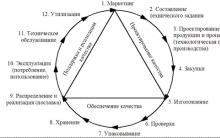Transition to an effective contract (sample order)
Decree of the Government of the Russian Federation of November 26, 2012 N 2190-r approved the Program, which provides for the improvement of the system of remuneration of employees public institutions and calculated for the period from 2012 to 2018 (hereinafter referred to as the Program). In accordance with the Program, effective contracts with employees began to be introduced in many areas, including education, health care, and culture. The basis for innovations in the organization is the order to switch to an effective contract, a sample of which will be given in this article.
Action plan for the transition to an effective contract
The regulatory framework for the implementation of the transition includes:
- A program that contains, among other things, an exemplary contract form;
- Decree of the President of May 7, 2012;
- action plans developed in various fields of activity at the federal, regional and local levels;
- Design Recommendations labor relations, approved April 26, 2013 by the Ministry of Labor of Russia;
- recommendations on the development of performance indicators in various areas;
- evaluation criteria and recommendations for their application, approved in the regions and locally.
The action plan, as a rule, is contained in the order for the transition to an effective contract. Mandatory form this order has not been approved, however, according to generally accepted practice, the order usually contains:
- name of the institution and details of the order (date, number);
- a provision on the transformation of labor relations with employees in accordance with the requirements for an effective contract;
- regulation on the approval of the commission, which is designed to develop performance indicators for employees of the institution, regulations on remuneration and new forms of labor contracts, including additional agreements that change existing labor contracts;
- an indication of the need to notify employees of upcoming changes and the conclusion of additional agreements.
Depending on the stage at which the order is issued, it can approve the indicators developed by the commission, the incentive procedure and the form of an effective contract.
Order on the transition and other documents on this issue (regulations on the assessment of the work of employees, new forms of employment contracts, local acts on remuneration, including incentive payments, etc.) are posted on the official website of the institution.
Sample order for transition to an effective contract
Introduction of an effective contract: additional agreement
Additional agreements are concluded with employees who are in an employment relationship with the employer at the time of the transition, taking into account the provisions contained in Article 74 of the Labor Code of the Russian Federation, since there is a change in conditions employment contract, which cannot be saved.
The employee must be notified at least two months before the change takes effect. If the employee was not notified, but signed supplementary agreement, it is considered that the employee, by his actions, expressed his consent to the changes.
With the introduction of an effective contract in education, culture, healthcare and other social spheres an additional agreement is concluded after the development of indicators and evaluation criteria by a particular institution.
The supplementary agreement states:
- the reasons why the terms of the employment contract are changed (in this case, the Program indicated at the beginning);
- labor duties of the employee (if they were not specified or specified in the employment contract);
- employee performance indicators and criteria for its evaluation;
- the procedure for remuneration, including compensation and incentive payments;
- provisions for social insurance and other support measures, etc.
It should be noted that if the terms of the additional agreement worsen the position of the employee and contradict labor legislation and local acts, the employee may refuse to sign it and complain about the employer.
Sample supplementary agreement to an employment contract in connection with the transition to an effective contract
____________________________________________
(Full name of the employee)
address: RB Karaidel district, village Karaidel ____________________________________________
from M of the municipal general educational budgetary institution Karaidel secondary school No. 2 municipal district Karaidelsky district of the Republic of Bashkortostan
address: Republic of Bashkortostan, Karaidel district, village of Karaidel, Stroiteley st., 1, telephone: 2-05-75__, fax machine: _2-05-75_,
the address Email: karaidelsosh [email protected] mail . en
Notification
on the transition to an effective contract
Municipal general education state-financed organization Karaidel Secondary School No. 2 of the Municipal District Karaidelsky District of the Republic of Bashkortostan in accordance with the requirements
Labor Code Russian Federation and Ministry of Labor
Russia dated April 26, 2013 N 167n hereby notifies __________________________
(Full name of the employee)
that due to changes in conditions employment contract and with the implementation of a phased improvement of the wage system in state (municipal) institutions for 2012 - 2018, approved by order of the Government of the Russian Federation of November 26, 2012 N 2190-r, in ___ Municipal educational budgetary institution
Karaidel Secondary School No. 2 of the Municipal District Karaidelsky District of the Republic of Bashkortostan an effective contract is introduced.
In connection with the introduction of an effective contract in the Employment Contract
from "___" ________ ____ g. N ___, concluded between __ municipal educational budgetary institution Karaidelskaya secondary school No. 2 of the municipal district Karaidelsky district of the Republic of Bashkortostan and _______________________, it is necessary to make the following changes regarding, among other things, the procedure for remuneration of labor: _______________________________________.
According to of the Labor Code of the Russian Federation on upcoming changes determined by the parties to the terms of the employment contract, as well as on the reasons that necessitated such changes, the employer is obliged to notify the employee in writing no later than two months, unless otherwise provided by the Labor Code. Russian Federation.
In case of agreement with the introduction of these changes to the Employment Contract dated "___" _______ ____, N ___, it is necessary to sign the corresponding additional agreement within 2 (two) months from the date of receipt of this notification.
According to of the Labor Code of the Russian Federation, if the employee refuses the proposed work, the employment contract is terminated in accordance with Labor Code of the Russian Federation.
If within 2 (two) months from the date of receipt of this
notice ____________________ will not be answered or __________________
refuses to make these changes to the employment contract, then the Labor
the contract dated "___" _______ ____ g. N ___ is terminated in accordance with
from the Labor Code of the Russian Federation.
(signature)
School director I.M.Kharipov
The topical issue of the transition to an effective contract in health care institutions is of great interest to trade union activists, personnel officers, and economists of health care institutions. This topic was the subject of a seminar organized by the Terkom of the trade union, which took place at the end of 2013. F.N.Kadyrov, Deputy Director for Economic Affairs of the Federal State Budgetary Institution "TsNIIOIZ", made a presentation "Effective contract: new in the regulation of labor relations in healthcare." We bring to your attention the continuation of the presentation of the topics considered by F.N.
Reasons for amending the employment contract
In a previous publication, we pointed out that, from the point of view of labor legislation, the introduction of an effective contract is an amendment to the current employment contract. In accordance with the order of the Ministry of Labor and social protection of the Russian Federation dated April 26, 2013 No. 167n “On approval of recommendations on formalizing labor relations with an employee of a state (municipal) institution when introducing an effective contract” (hereinafter referred to as the Recommendations of the Ministry of Labor), it is planned to amend employment contracts unilaterally at the initiative of the employer in accordance with Article 74 of the Labor Code of the Russian Federation (hereinafter referred to as the Labor Code): “In accordance with part two of Article 74 of the Labor Code of the Russian Federation, the employer is obliged to notify the employee in writing no later than two months, unless otherwise provided by the Labor Code of the Russian Federation.
At the same time, changes in the employment contract at the initiative of the employer are allowed only when the terms of the employment contract determined by the parties cannot be preserved by the employer. The employer must have objective reasons for the impossibility of maintaining the currently existing terms of the employment contract. For example, he introduces new (additional) equipment, and the need for services provided with his help is great, which forces some employees to transfer to a different work schedule (second shift), etc.
Thus, the employer must not only indicate the reason for the change in the terms of the employment contract, but also prove that it was indeed impossible to maintain the previous working conditions. That is, it is necessary to specify exactly what reasons are the grounds for changing the terms of the employment contract in this particular case. There are two of them: these are changes in organizational or technological conditions labor. Therefore, when notifying an employee of changes in working conditions, it is necessary to inform him of the reasons for introducing such changes. Otherwise, the actions of the employer (administration of the institution or authority in relation to the head of the institution) will be considered illegal.
What conditions of a valid employment contract with an employee cannot be saved?
Before touching on the question of what conditions of the current employment contract with the employee cannot be saved (will be changed), let's consider what the terms of the employment contract are.
Of all the conditions of an employment contract listed in Article 57 of the Labor Code, only the terms of remuneration change unambiguously with the introduction of an effective contract. This will be a key change in the terms of the employment contract.
Also, the employment contract may provide for additional conditions that do not worsen the position of the employee compared to the established one. labor law and other normative legal acts containing norms labor law, collective agreement, agreements, local regulations, in particular, on clarification in relation to working conditions this employee the rights and obligations of the employee and the employer established by labor legislation and other regulatory legal acts containing labor law norms.
So, as part of the introduction of an effective contract, the terms of remuneration will be changed and the duties of the employee will be clarified (in terms of achieving performance indicators for his activities, etc.).
Other conditions of the employment contract may also change (for example, if the introduction of an effective contract may coincide with the reorganization of the institution, etc.).
Why Article 74 of the Labor Code?
It is natural to ask what organizational or technological working conditions have suddenly changed so much that the terms of the employment contract determined by the parties cannot be preserved? Actually, this article The TC is designed for other situations: the replacement of equipment that manual labor, on the automated systems etc. But there was no other more suitable article for the situation of implementing an effective contract in the Labor Code.
Recall that Article 74 does not establish an exhaustive list of what falls under the concept of “changes in organizational or technological working conditions”. It states: “in the case when, for reasons related to changes in organizational or technological working conditions (changes in engineering and production technology, structural reorganization of production, other reasons )…».
The transition to an effective contract forces one to look for those very “other reasons”. When changing the employment contract unilaterally, the employer is obliged to indicate these reasons. What are they? First of all, we note that they cannot be changes in the conditions of remuneration, by themselves, since to cause a change in the conditions of remuneration by a change in the conditions of remuneration is a logical vicious circle. There must be other reasons that necessitated both changes in the conditions of remuneration and clarification of job responsibilities.
Further. It is necessary to justify the changes made to the employment contract in terms of their inevitability. To do this, it is advisable to refer to the order of the Government of the Russian Federation dated November 26, 2012 No. 2190-r “On approval of the Program for the gradual improvement of the wage system in state (municipal) institutions for 2012-18”, as well as other related to the introduction of an effective contract normative legal acts.
It is this document that contains the reasons why the terms of the employment contract determined by the parties cannot be saved. These reasons are establishing indicators and criteria for assessing the effectiveness of their activities for employees.
It is the emergence of these indicators and criteria that leads to the need to change the conditions of remuneration and clarify job responsibilities in employment contracts.
The procedure for amending an employment contract in accordance with Art. 74 TK
The procedure for amending an employment contract in accordance with Art. 74 TC, in principle, is not very complicated. Specialist personnel service it is necessary to prepare two copies of the notification with a warning about changes in the essential terms of the contract. At the same time, the notification must not only indicate the changes in the employment contract that the employer provides, but also the reasons that are the basis for introducing such changes.
One copy is handed over to the employee, on the other, remaining in the institution, the employee will have to sign for receipt of his copy.
The employee may not immediately express consent or unwillingness to work under the new conditions. If we are talking about changing the terms of the employment contract for a sufficiently large number of employees, then in the end the HR employee may forget who agreed to the new working conditions and who refused them. Moreover, the unwillingness to work in accordance with the new terms of the employment contract is often expressed by employees orally. Therefore, it is better to immediately offer appropriate vacancies when warning an employee about a change in working conditions. These should be all vacancies of the institution - both corresponding to the qualifications of the employee, and vacancies that are lower than his qualifications. The only exceptions are those vacancies that are located in another area. Their institution is obliged to offer, if it is provided for by the collective agreement or agreement. It should be remembered that vacancies must correspond to the state of health of the employee. Therefore, it is possible to prepare either a separate document in two copies (on what remains in the hands of the administration, the employee must sign for receipt), or you can offer vacancies already in the notification of changing the terms of the employment contract. In this case, you can use approximately the following wording: “In the event that you refuse to continue working under the new conditions, we can offer you the following vacancies currently available in the institution ...”.
Accordingly, if the employee does not agree to change the terms of the employment contract, but is ready for a transfer, the latter is drawn up in the standard manner. If neither the new working conditions suited the employee, nor a suitable position in which he would like to work was found, it is necessary to dismiss the employee under paragraph 7 of Art. 77 of the Labor Code (refusal of the employee to continue work due to a change in the terms of the employment contract determined by the parties).
If the employee agrees to work under the new conditions, then two months after receiving the notification, it is necessary to sign an additional agreement with him to his employment contract.
Notification of changes in the terms of the employment contracttc "Notice of changes in the terms of the employment contract"
A written notice is drawn up, as usual, in two copies, one of which is transferred to the employee, and the other remains with the employer. On the copy of the employer, the employee must sign the receipt of the notification, putting down the date. If the employee refuses to sign, his refusal is activated. The act of refusal to receive a notification or to sign on it can be drawn up as a separate independent document in accordance with all the rules of office work, or can be made in a simplified form right on the notification.
The consent or refusal of the employee can be formulated by the employee directly on the notice (on the copy of the employer), or by signing an additional agreement to the employment contract. But this is possible only when the employee makes a decision immediately, without hesitation. The law does not specify exactly when the employee must give an answer, so it is quite possible that he will need exactly two months to think and on the last day he will inform the employer of his decision. In this case, this decision can be made in the form of a statement of consent or refusal to work in accordance with the new terms of the employment contract. The expression of consent, again, can be formalized by signing an additional agreement to the employment contract.
According to the logic of the law, the absence of objections from the notified employee indicates that he agrees to change the terms of the contract. Meanwhile, only a signature on familiarization does not mean consent, and the employee can declare this in court. In case of a possible dispute, the administration of the institution should make sure that the employee signs not only that he has been notified of the changes, but also that he agrees to continue working in such conditions.
So, if the employee agrees to continue working, an additional agreement is concluded with him, in which all changes in the employment contract must be recorded.
The conditions that must be met in order for the dismissal of an employee under paragraph 7 of Art. 77 of the Labor Code was lawful:
3) there are no vacancies suitable for him in the institution.
1) the employee was warned about the upcoming changes two months in advance;
2) he refused to continue working;
3) he was offered another suitable job;
4) the employee has received a refusal from the job offer.
Documentation can be done in the following order:
A. In the absence of vacancies suitable for the employee, taking into account his qualifications and state of health.
1. The employee is given a written notice of a change in two months of the essential parameters determined by the employment contract. The notice must clearly indicate which specific conditions will be changed and how and when this will happen (no earlier than two months later).
2. On a copy of the notice that remains with the employer, the employee signs: "Notification received (date), signature, transcript."
3. On the same copy of the notice or in a separate statement, the employee informs the employer of his refusal to continue working in the new conditions.
4. The employer issues an order to dismiss the employee, which indicates the reason for the dismissal and records the fact that there is no suitable vacancy, for example: “dismiss due to refusal to continue working due to a change in the terms of the employment contract and the absence of vacancies suitable taking into account qualifications and health status (paragraph 7 article 77 of the Labor Code)”.
Base:
1. Order on the maintenance of a new form of an employment contract as part of the implementation of an effective contract dated (date) No. ... (exemplary wording of the order)
2. Notice dated (date) No. …
B. In case of refusal of the proposed work.
1. The employee is given a notice of changes in the terms of the employment contract against receipt.
2. The employee writes (on a notice or in the application form) a refusal to continue working.
3. He is given a list of vacancies indicating positions (professions) and wages.
4. The employee in writing expresses his refusal from the proposed vacancies (or an act of refusal is drawn up).
5. An order is issued to dismiss the employee, which indicates the reason for dismissal and fixes the fact of refusal of the proposed work: “dismiss due to refusal to continue work due to a change in the terms of the employment contract and refusal of the proposed work, paragraph 7 of Article 77 of the Labor Code”.
Base:
1. Order on the maintenance of a new form of an employment contract as part of the implementation of an effective contract dated (date) No. ... (exemplary wording of the order).
2. Notice dated (date) No. …
3. Refusal to continue work from (date).
4. List of vacancies for (date).
5. Refusal of the proposed work from (date).
It would not be superfluous to recall that changes in the terms of the employment contract, which were introduced in accordance with Art. 74 of the Labor Code, should not worsen the position of the employee in comparison with the established collective agreement and agreements. Thus, the employer does not have the right to offer the employee a change in working conditions if they worsen the position of the employee in comparison with the conditions and guarantees of the collective agreement and applicable to this employer agreements on social partnership(sectoral, territorial, etc.).
Is it always necessary to notify an employee about the transition to an effective contract 2 months in advance?
The introduction of an effective contract should be carried out within the framework of the Labor Code. We have already said that the Recommendations of the Ministry of Labor imply the introduction of an effective contract in accordance with Article 74 of the Labor Code (unilaterally at the initiative of the employer). But there is also Article 72 of the Labor Code (by the way, the main one in terms of amending the employment contract). It assumes: “Changing the terms of the employment contract determined by the parties, including transfer to another job, is allowed only by agreement of the parties to the employment contract, except as otherwise provided by this Code. An agreement to change the terms of an employment contract determined by the parties is concluded in writing.
Therefore, the following procedure can be carried out. The employee is invited to the personnel department and informed that, in accordance with a number of normative documents(they must be listed) transfers of workers are carried out throughout the country public sector for an effective contract. In this regard, the employee is invited to sign an additional agreement to the employment contract, which enters into force on a specific date, and this document is given for review.
If the employee signs an addition to the employment contract, the amendments to the employment contract are considered to be made in accordance with Article 72 of the Labor Code, that is, by agreement of the parties. No two-month notice is required in this case. Note that the introduction of amendments to the employment contract does not have to be tied to the 1st day of the month, but this can cause difficulties in calculating the values of incentive payments according to different criteria (before and after amendments to the employment contract).
If the employee did not agree with the proposal to voluntarily sign an additional agreement to the employment contract, he is given a notice of changing the employment contract in accordance with Article 74 of the Labor Code and the procedure described above is performed in relation to this article.
An effective contract is a type of a special type of employment contract that is used in all government agencies and public sector enterprises. It specifies the conditions and objectives of the work and remuneration for it. We told you what an effective contract is in a budgetary organization and how to draw it up.
What is an effective contract
Such a concept appeared along with the Program for the gradual improvement of the wage system in state institutions (approved by the Decree of the Government of the Russian Federation of November 26, 2012 No. 2190-r). It states that an effective contract specifies:
- all official duties employee;
- wage and the conditions for obtaining it;
- performance indicators;
- indicators of the quality of state (municipal) services provided;
- bonuses, additional payments and other incentive payments, as well as the conditions under which they can be received;
- measures of social support (the so-called social package).
Thus, an effective employment contract establishes a relationship between wages and the results of the work of a budgetary organization. Such an agreement is used in state and budget organizations, but it was invented in order to increase the effectiveness of the work of officials and state employees. For completeness of understanding, at the end of the article, we have provided a sample of an effective contract.
What do you need to conclude
The main conditions are formulated in the recommendations on formalizing labor relations with employees of state and municipal institutions (approved by Order of the Ministry of Labor dated April 26, 2013 No. 167n). So, in paragraph 2 it is said that for each employee it is necessary to clarify and specify:
- work obligations;
- indicators and criteria of labor efficiency;
- remuneration;
- bonuses and other incentives for achieving collective results of work.
The form of an effective contract must also take into account regulations(and if they are not there, be sure to develop them), which determine:
- wages (including salaries) official salaries), salary rates, surcharges, allowances);
- regulation of labor;
- working conditions based on the results of their special assessment;
- working hours and rest time;
- conditions that determine the nature of work (mobile, traveling, on the road, other nature of work).
The main problem in the development and introduction of an approximate form of an employment contract (an effective contract) is to develop understandable and easily measurable performance indicators. They need to be carefully considered and be sure to be tested in practice before they are included in the document. The system of requirements for employees should be the same for all, arising from the requirements for the activities of the state institution itself. There should be no contradictions with the state and municipal task and other similar documents. If this condition is not met, then the new contract will remain just a more voluminous labor contract and will not provide the efficiency for which it is developed and implemented.
A sample of an effective contract (an effective contract with the chief accountant), as well as other required documents you will find at the end of the article. You may also be interested in instructions for developing and implementing such agreements with , . In the articles on the links you will find the necessary samples.
How to implement
The process itself is not difficult. It consists of four stages, but each of them can take a long time as a comprehensive assessment is required. current position affairs in the organization and search for the optimal solution. Experts even advise creating a special working group from representatives of the administration, employees and the trade union (if any).
Stage 1. Working with documentation
First of all, it is necessary to develop or harmonize that internal normative documentation, which defines:
- criteria for assessing labor efficiency;
- labor standards, taking into account industry specifics;
- the content and scope of functions of each position according to the staffing table.
Remember that all local documents must be approved, and for new ones you need to determine the date of entry into force.
Stage 2. Making changes
The next step is to change the internal labor regulations, the regulation on remuneration, bonuses, incentive and compensatory payments, as well as job descriptions.
Stage 3. Development of the contract and additional agreements
Now you can develop a sample effective contract for each position. They will be concluded with new employees.
For those who are already registered according to the old rules, it is necessary to prepare additional agreements for existing employment contracts. With their help, the old working conditions will be replaced by new ones.
Stage 4. Signing of additional agreements
At the last, fourth, stage, it is important to strictly comply with all the requirements and rules established by Labor Code RF. The transition from a regular employment contract to an effective one is nothing more than a change in conditions at the initiative of the employer. Therefore, it is important to correctly sign additional agreements to the employment contract with current employees institutions. Otherwise, you will not be able to demand that the employee fulfill the new requirements, and pay in proportion to the effectiveness of his work.
First of all, you should send the employee a written notice no later than two months.
If he agrees to change the conditions, you can sign an additional agreement to the employment contract in the prescribed manner. At the same time, it is not necessary to wait for two months to expire; you can sign it as soon as the consent of the employee is received.
Everything becomes more complicated if the employee refuses to enter into an additional agreement. In this case, it is necessary to offer in writing another vacant position, including a lower paid one. The main thing is that the employee can take it (part 3 of article 74 of the Labor Code of the Russian Federation). The main problem is that often a budgetary institution completely switches to new system wages. And in such a situation, it will be difficult to find a vacancy that would not provide for work in the new conditions. In this case, the employment contract is terminated (clause 7, part 1, article 77 of the Labor Code of the Russian Federation) with payment of compensation.
Back to
In the Russian Federation, such a concept as an "effective contract" has appeared. The reason for this was the adoption by the authorities of the country of an order that approved the algorithm for changing the wage system. The innovation concerns everyone who works in state and municipal institutions.
Let's take a look at what a notification about the transition to an effective contract should look like and everything connected with it.
Notice of transition to an effective contract - main method, through which the employer informs his employees about the replacement of the usual employment contract. Therefore, it must be properly prepared and provided to employees.
The notice must detail the essence of the changes, as well as the date of their entry into force. According to the current legislation, the notice must be handed over to employees who, after reading it, put their signature.
However, it must be provided in writing. Since oral notification of the replacement of an employment contract is prohibited by applicable law.
It is worth noting that absolutely all activities related to the introduction of an effective contract should take place in an open form. Each of the points of the contract is discussed by the whole team.
As of today, a unified form of notification simply does not exist. For this reason, it is perfectly legal for companies to use freeform.
It is also important that the composition of the notification itself is also not established by law. Despite this, there are requirements that must be taken into account.
First of all, the notification must contain detailed description new terms of an effective contract. There should also be a note that explains the need for these changes.
In addition to following the notice order, the employer must also comply with the notice periods themselves. According to the current legislation, a legal entity is obliged to notify employees of upcoming changes two months in advance, and if the employer is religious organization then no later than seven days.
Since effective contracts do not apply to the latter, in our case, the law allocates two months for notification of changes in the terms of an employment contract until the amendments are made.
![]()











Layout of the house, plans of houses and cottages
Small Business - Home Production Ideas
History of JANOME. Sewing machines. Janome, Veritas, Pfaff Sewing machine janome manufacturer country
Working with the tattis system
Properties of copper and its application